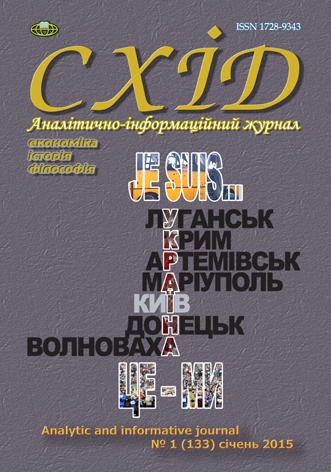The problem of subject within the dimension of philosophical mysticism
DOI:
https://doi.org/10.21847/1728-9343.2015.1(133).40170Keywords:
subject, philosophy, mysticism, consciousness, phenomenology, ontologyAbstract
The article explores the possibility of reconstruction of the concept of subject out of the discourse of mystical experience. The novel forms of philosophical theories are proved to be homogeneous to the mystical elements of the general structure of religious systems. Postmodernist trends of contemporary philosophy promoting weak phenomena of human world provide the epistemological background for new vision of religious mysticism, which was always dominated by collective forms of religiosity and disqualified as too individualistic and esoteric. Apophatic morphology of speculative mysticism resembles the conceptual apparatus of deconstruction or negative dialectics. Therefore it can be effectively reinterpreted as philosophical locus of religion, which is congenial to absorb the novel philosophical forms and translate them into religious discourse. The mystical experience cannot be subjective, because "subjective" implies either privateness or disorder. We cannot say that mystical experiences are either ordered or disordered, because they have no parts to be compared and contrasted with one another or with the order of the natural world - only sequences of experiences can be ordered or disordered. But mystical experiences must be something, so if they are neither objective nor subjective, we have to create a new category - transsubjective - for them.
Mystical intuitions about subjectivity without Ego are considered as preceding attempts of phenomenology, fundamental ontology and deconstruction to conceptualize the dynamics of becoming of subjectivity out of certain primordial form of subjectity. The necessity of new synthesis of philosophical and religious conceptions of subjectivity appears from the harsh controversies of contemporary world, which is losing the common order of meaning, very likely to face the demise of some common system of laws and rights. To reconstruct a mystical subjectivity by the means of today's philosophy is to hope for reconciliation of scientific ratio with religious fidelity in terms more appropriate to the reality we are living in.Downloads
References
Shabanova Yu. (2005), Transpersonal metaphysics of Meister Eckhart: In the contest of development of European philosophy, National mining university, Dnipropetrovsk, 237 p. (rus).
Skyrtach V., (2014), Phenomenological research strategies of mentally ill subject, Skhid, 5(131), pp. 116-120 (ukr).
Forman K. C. (ed), (1990), The problem of pure consciousness: mysticism and philosophy, Oxford University Press, New York, 318 p. (engl).
Karpenko A., (2013), The category of subject in Martin Heidegger's philosophy: exposition of the problem, Ostroh Academy scientific writings: Philosophy, 14, pp. 111-114 (ukr).
Marshall P., (2005), Mystical encounters with the natural world: experiences and explanations, Oxford University Press, Oxford, 337 p. (engl).
Downloads
Published
How to Cite
Issue
Section
License
Copyright (c) 2015 Viacheslav Stepanov, Iryna Luchynska

This work is licensed under a Creative Commons Attribution-NonCommercial-NoDerivatives 4.0 International License.
1. Authors bear responsibility for the accuracy of facts, quotations, numbers and names used.
2. Manuscripts are not sent back.
3. The publisher does not always agree with the authors' opinion.
4. The authors reserve the right to authorship of the work and pass the first publication right of this work to the journal under the terms of a Creative Commons Attribution-NonCommercial-NoDerivatives 4.0 International License. This license allows others to distribute (copy) the published work for non-commercial purposes, provided there is mandatory attribution to its authors and a link to the first publication in our journal.
5. The authors have the right to conclude separate supplement agreements that relate to non-exclusive work distribution in the form in which it has been published by the journal (for example, to upload the work to the online storage of the journal or publish it as part of a monograph), provided that the reference to the first publication of the work in this journal is included.

